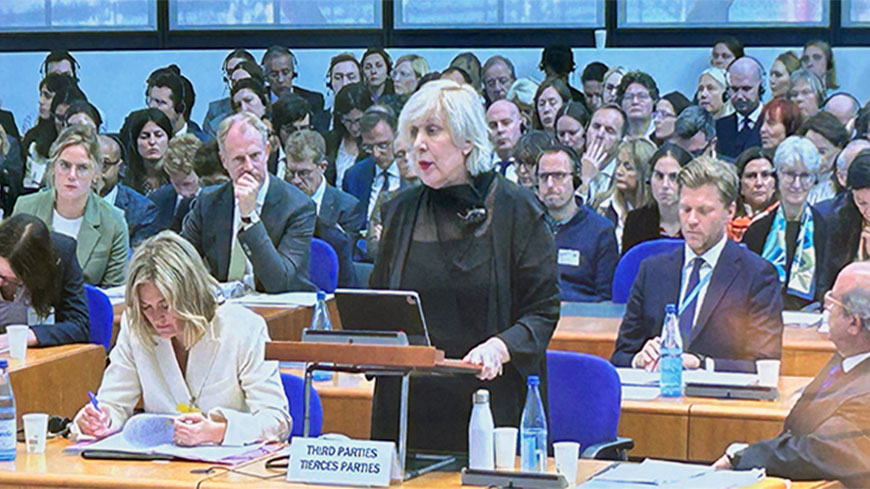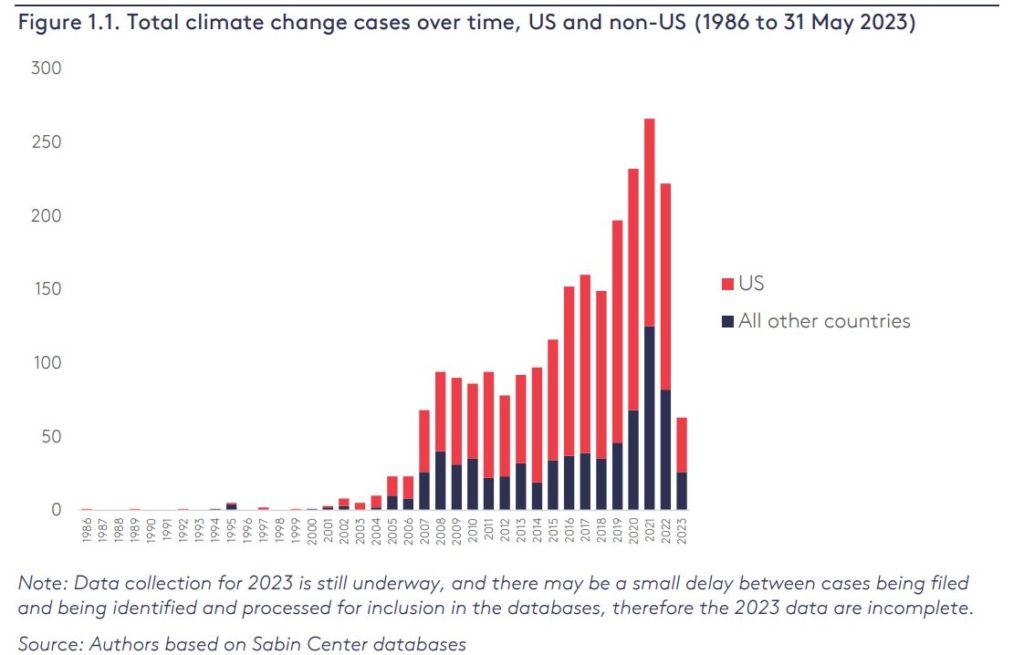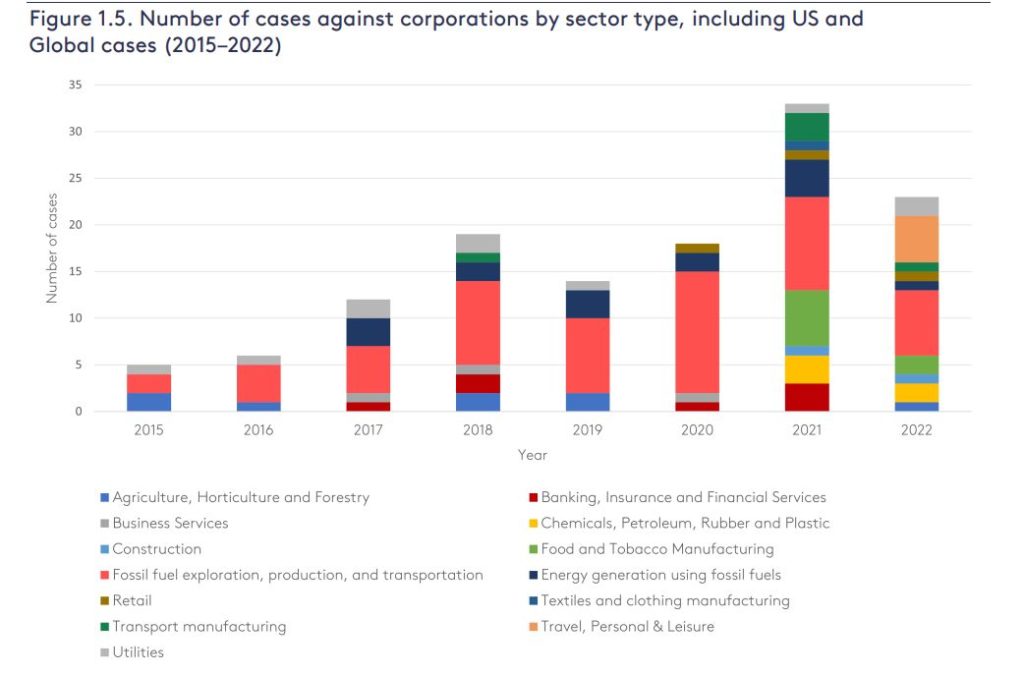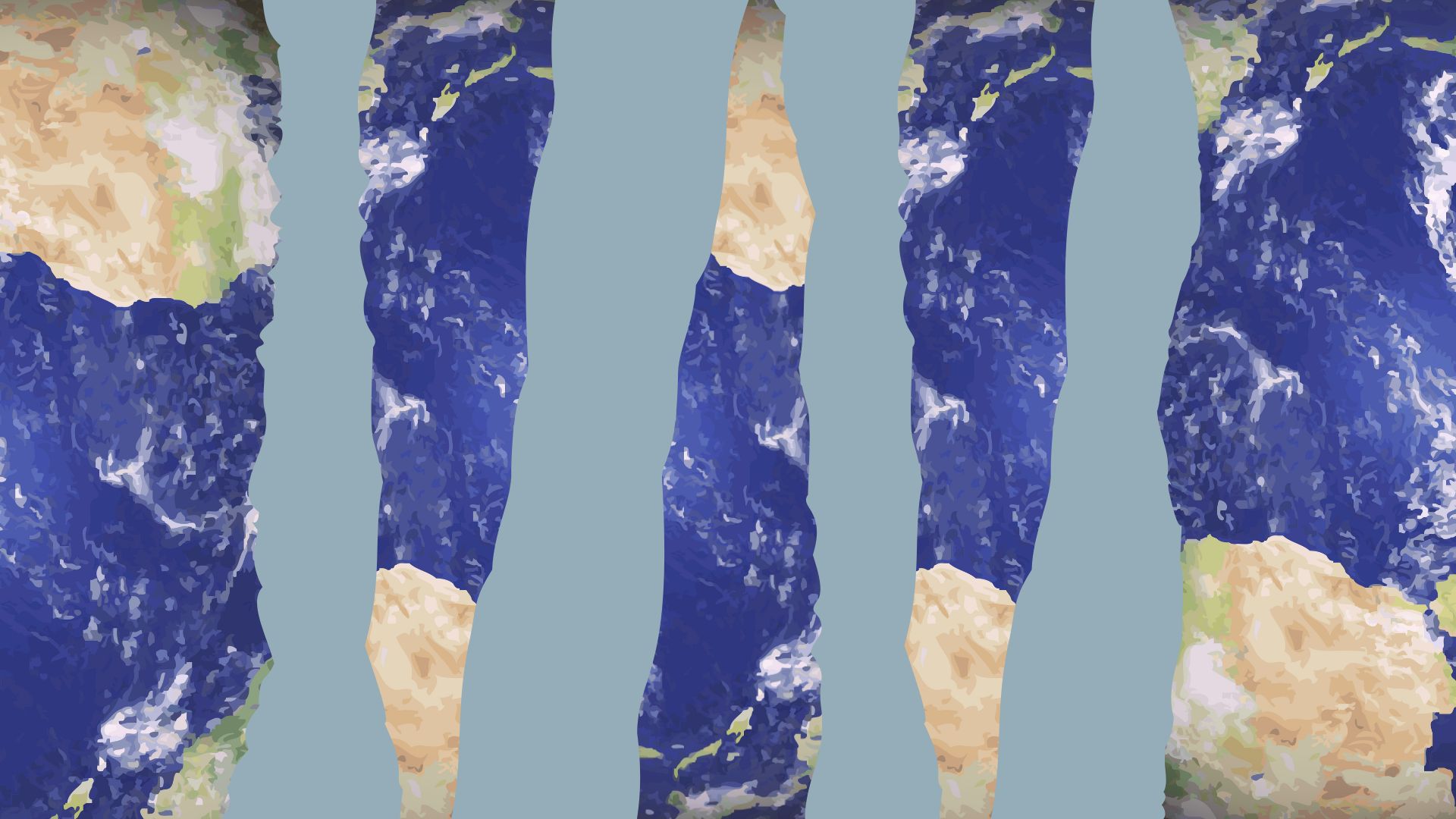Original article (in Croatian) was published on 29/09/2023; Author: Ana Benačić
Around the world, lawsuits are being filed against corporations and governments for covering up and ignoring the climate crisis and its consequences. Croatia was also sued.
Last year, a group of INTERPOL advisers published a preparatory document on predictions of changes in criminality and legislation that could be caused by the climate crisis. The list of crimes against the climate, against people threatened by the climate crisis and the entire human species is long.
Examples cited in the orientation document of the INTERPOL Innovation Center’s Futures and Foresight Laboratory include the worsening of some of the oldest and most brutal forms of crime. As human trafficking accompanies all migrant crises, the same can be expected for climate refugees, whose number could grow to 216 million by 2050. Another example is water cartels. They are reminiscent of the SF movie “Mad Max: Fury Road”, although they have already been seen in reality, for example in Pakistan or Kenya. INTERPOL advisers mention them in the context of exploiting scarcity by charging for basic necessities such as drinking water at astronomical prices.
Some of the listed crimes could not even exist until recently. An example is phantom forests, i.e. trees that companies promised to plant to reduce their carbon footprint, but did not do so. Cryptojacking, a cybercriminal activity that involves the unauthorized use of other people’s computer devices to mine cryptocurrencies, is estimated to increase in the future. Namely, Bitcoin annually “eats” more electricity than the whole of Argentina.
It is also expected that in the coming period, ecocide could become the fifth crime prosecuted by the International Criminal Court after genocide, war crimes, crimes against humanity and aggression already mentioned in the Rome Statute. They also consider the proposed term postericide, coined relatively recently by political scientist Catriona McKinnon to name the crime of intentional or reckless behaviour capable of bringing humanity to extinction, with an emphasis on influential individuals. The newly released postericide is closely related to the crime of “organized denial of climate science”, i.e. intentional misleading about the harmfulness of emissions.
“Research has shown that a large part of (online) climate mis/dis-information is financed, produced and amplified through a network of actors, especially on social networks”, say INTERPOL advisers. Government policies differ greatly on this topic, they continue, but an increasing number of countries require repressive measures against climate disinformation on the Internet, so one day the police may also deal with this.
But even without postericide and police interference in the portrayal of the climate crisis, courts around the world are already widely debating climate disinformation. At the same time, representatives of oil companies, their professional associations and quasi-independent organizations of experts are paraded on the dock.
Croatia before the court
Hundreds of legal proceedings have been initiated around the world for crimes against the environment and climate, and one of them is directed against the authorities in the Republic of Croatia. Before the European Court of Human Rights, Croatia was sued along with 31 other countries for wrongdoing. More specifically, a group of young people from Portugal – a country particularly vulnerable to climate warming – decided to sue all EU member states, as well as Turkey, Russia, Great Britain, Norway and Switzerland, together with the law firm GLAN. The original lawsuit was also filed against Ukraine, but they dropped it because of the war.

“Environmental degradation associated with climate change has a devastating effect on the enjoyment of human rights for all of us. But especially on children and young people like the applicant in this case. This affects their physical and psychological health, their civil, political and social rights, as well as their dignity. Therefore, it is crucial to adopt an approach based on children’s rights regarding climate change and how it affects their human rights”, Dunja Mijatovic, Commissioner for Human Rights of the Council of Europe, said at the hearing.
In this case, 33 countries are accused of not doing enough to prevent global warming which will fall on the shoulders of today’s youth and future generations. According to Nacional, the Croatian authorities are not particularly worried, even though this is one of the rare cases that had a hearing before 17 judges of the Grand Chamber of the ECtHR. The Council takes into consideration only the most important cases, and the hearing was held on September 27. The ultimate goal of the lawsuit is the acceleration and implementation of more ambitious climate policies – reducing the consumption and extraction of fossil fuels, reducing emissions from consumption through the import of goods, as well as forcing companies based in Europe to reduce their emissions.
The Grand Chamber of the European Court of Human Rights has already held hearings in the two climate cases it is considering – KlimaSeniorinnen v. Switzerland and Careme v. France. But in the court’s rich jurisprudence related to the environment, the case of Duarte Agostinho and others v. Portugal and 32 others still stands out, according to the latest report by the Sabin Center, a division of the Columbia University Law School in New York, which specializes in the development of legal techniques to combat climate change.
“Despite its silence on this issue so far, the Strasbourg system is a promising address for future prosecutors in climate cases given the existing practice of the Court on environmental issues – the Court has ruled in around 300 cases related to the environment (ECHR, 2022). Although the right to a healthy environment is not expressly protected by the Convention, the Court found that the failure of governments to protect citizens from harmful effects on the environment caused by pollution may constitute a violation of protected rights, especially the right to life and private and family life (Articles 2 and 8 of the European Convention on human rights)”, says the report.
A ruling that could oblige countries to abandon fossil fuels and drastically reduce emissions is expected in the middle of next year at the earliest.

A total of 67 cases were brought before the Court of the European Union. But the United States remains the country with the highest number of documented climate cases, with a total of 1,590 cases. It is followed by Australia, where 130 cases have been identified, and Great Britain, where 102 cases have been identified. Relatively high numbers of cases were also documented in Germany (59), Brazil (40) and Canada (35).
A wave of lawsuits in America
California, the largest and richest US federal state, hit by droughts, fires and rising sea levels, also filed a lawsuit against oil companies in September, for causing global warming and the consequent damages of a heated climate, as well as for misleading the public. This made it the largest geographic area and largest economy to sue the giant oil companies, joining the states of Connecticut, Delaware, Hawaii, Maryland, Massachusetts, Michigan, Minnesota, New Jersey, New York, New Mexico, Oregon, Pennsylvania, Rhode Island, Washington and the federal District of Columbia.
California is suing Exxon Mobil, Shell, Chevron, ConocoPhillips and BP, as well as the American Petroleum Institute (API) for allegedly participating in a decades-long “campaign of climate change deception and misrepresentation”. They are accused of causing damage to public health, property, infrastructure and natural resources, false advertising and misleading “green” marketing and illegal, unfair and fraudulent business practices.
In a separate case, California could hold oil companies and the petrochemical industry liable for plastic pollution. Among the most responsible, they see Exxon, considering it one of the biggest polluters. As fossil fuels are slowly being replaced by clean energy sources, petrochemical companies have doubled down on plastic production, recently investing an additional $208 billion to expand plastic production worldwide, according to the lawsuit announcement. Fossil energy sources are, namely, the key raw material for the production of plastic.
“Plastic pollution seeps into our waterways, poisons our environment and destroys our landscapes… Too much is too much. For more than half a century, the plastics industry has waged an aggressive campaign to mislead the public, perpetuating the myth that recycling can solve the plastics crisis. It’s true: the vast majority of plastic cannot be recycled, and the recycling rate has never exceeded 9%”, California Attorney General, Rob Bonta, said on the subject. This is the first inquiry to examine the role of the fossil fuel industry in creating and exacerbating the plastic pollution crisis – and what laws, if any, were broken in the process.
As one of the key reasons for launching the investigation, Bonta cites the fact that every week we consume a mass of plastic equal to the size of a credit card – through the water we drink, the food we eat and the air we breathe. In the average 79 years that people live in America, that amount rises to 20 kilograms – the equivalent of two empty 240-litre mobile containers.
Doubling the number since the Paris Agreement
In September 2023, the Sabin Center recorded 2,341 cases in the climate change litigation database, of which 190 were filed in the last 12 months. Their database is divided into global litigation against governments and against corporations, and singles out the US in particular.
The total number of lawsuits doubled in the period from the adoption of the Paris Agreement in 2015 to 2022. The peak was reached in 2020, immediately after the historic decision of the Dutch court, which was also the last year of the mandate of US President Donald Trump, who decided to leave the Paris Agreement. The Dutch Urgenda case resulted in a ruling that explicitly states that debates about the reality of climate change are behind us, as well as excuses that “our little drop” has no impact on global emissions:
“The defense that the state does not have to take responsibility because other countries do not comply with their partial responsibility cannot be accepted. Nor can it be accepted as a defense that the country’s own share of global greenhouse gas emissions is very small and that reducing emissions from its own territory does not make a big difference at the global level. Indeed, accepting this would mean that a country could easily avoid its partial responsibility by highlighting other countries or its small share. If, on the other hand, this defense is excluded, each country can effectively be held accountable for its share of emissions and the chances that all countries will actually contribute will be the highest”, stated the Supreme Court of the Netherlands.
Over time, lawsuits are gaining in variety. They are mainly divided into lawsuits against states that do not do enough to protect people from environmental devastation or to take measures to protect the climate, but many of them are directed against polluters, in order to collect damages that have occurred or those that will occur, but also against the banking system, even pension funds and consulting firms that encourage the expansion of the oil business with investments and services.
Greenwashing
Cases of “climate washing”, a subspecies of the more well-known “greenwashing”, i.e. misleading advertising that falsely or exaggeratedly portrays the efforts of companies and governments to care for the environment or the climate, are becoming more and more frequent. As many as 57 cases challenge inaccurate government or corporate narratives about contributing to the transition to a low-carbon future or disinformation about climate science. The vast majority of them (52) were filed against corporations.
The Commissioner for Justice of the European Commission condemned this practice. After finding a high percentage of unfounded or false ads, Didier Reynders called out “unscrupulous traders who throw dust in the eyes of consumers with vague, false or exaggerated claims”. Even the World Football Federation, FIFA, has been accused of greenwashing.

The report of the Sabin Center states that in the last seven years, 8 lawsuits have been initiated where the personal civil or criminal responsibility of people in executive positions in the government or in corporations is sought.
Climate-related litigation, then, does not rely exclusively on climate-tailored legislation. Legislation binding states to fight climate warming is a relative novelty and makes it much easier to win lawsuits. However, many of the best-known cases are based on previously existing obligations, such as the constitutions of countries, obligations to protect human rights, consumer rights, but also torts, i.e. civil law.
Effects
Climate disputes have both immediate and long-term effects. For example, it has been recorded that the polluter’s share price falls when a lawsuit is filed against him. The Intergovernmental Panel on Climate Change sees lawsuits as an important weapon to force governments and companies to finally start solving the issue of emissions. UN Secretary-General Antonio Guterres claims the same.
Earlier this year, he emphasized the role of the International Court of Justice, the UN’s main judicial body, in seeking accountability for the most serious crimes – and said he welcomed moves towards accountability for human rights abuses “including those committed by the private sector”.
“Legal challenges against climate-destroying corporations are an important step forward… Fossil fuel producers and their financiers must understand a key truth: the pursuit of mega-profits when so many people are losing their lives and rights, today and tomorrow, is completely unacceptable”, Guterres said.
According to the Sabin Center, in about 55 percent of the total 549 lawsuits that have been initiated and resolved so far, the judgments had favourable outcomes for the climate. In some cases, this has led to changes in policy. But whether successful or not, climate cases continue to have significant indirect impacts on climate change decision-making outside the courtroom.
Many remain open and may trigger new litigation if successfully resolved. The Sabin Center states that even those unsuccessful cases will help to clarify the jurisdiction of the courts for future generations of lawsuits, but also to identify the bearers of responsibility for individual climate crimes.



